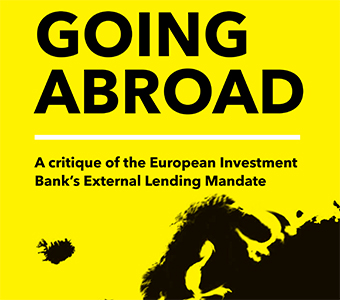The EU bank’s dubious overseas development experience shows it cannot be a key player in Europe’s response to the plight of refugees – report
The EIB is increasingly given a prominent role in the EU’s response to the so-called refugee crisis stretching the bank’s operations well beyond its current mandate for overseas investments. Yet, a new report by Counter Balance and CEE Bankwatch Network takes a closer look at projects the EU’s house bank has been financing outside Europe to find a dismal track record on a range of issues from transparency to human rights. This, the report authors say, should serve as a warning sign for the European Parliament and Council as they consider boosting the bank’s mandate.
18 November 2016

The EIB is increasingly given a prominent role in the EU’s response to the so-called refugee crisis stretching the bank’s operations well beyond its current mandate for overseas investments. Yet, a new report by Counter Balance and CEE Bankwatch Network takes a closer look at projects the EU’s house bank has been financing outside Europe to find a dismal track record on a range of issues from transparency to human rights. This, the report authors say, should serve as a warning sign for the European Parliament and Council as they consider boosting the bank’s mandate.
The report can be found here:
https://bankwatch.org/sites/default/files/going-abroad-EIB.pdf
A blog post with more details can be found here:
https://bankwatch.org/news-media/blog/here-be-dragons-how-eu-banks-development-finance-overlooks-people-risk
The European Investment Bank’s (EIB) 2014-2020 External Landing Mandate (ELM) is currently undergoing a mid-term review by EU institutions – and the European Commission has been the first to release its contribution.
On this occasion, the Commission is seeking to dramatically expand the EIB’s overseas operations by granting the bank extra EUR 3 billion in guarantees under its ELM. The Commission is also proposing to add EUR 2.3 billion in guarantees under this mandate – in total EUR 5.3 billion in guarantees – to address forced displacement that has led people fleeing war and persecution to embark on long, dangerous trips to reach Europe.
For this purpose, the EIB’s proposed “Resilience Initiative” is intended to mobilise billions of euros in private investments in the private and public sectors in the western Balkans and the Middle East and north Africa over the next four years. Yet, the increased guarantee ceilings do not include any concrete provisions to ensure the effectiveness of the bank’s operations.
In addition, the EIB is also set to become a key player in the Commission’s proposal for an “External Investment Plan,” an all-out investment offensive in Africa and in the European Neighbourhood regions meant to stem migration.
But the new report, examining how the EIB has delivered on its ELM so far, reveals that the bank’s lending outside the EU has been plagued by a range of fundamental problems.
The findings presented in the report raise serious concerns about the EIB’s overseas development role including transparency and access to information practices, the bank’s approach to tax evasion and tax dodging, enforcement of sustainability standards, and human rights due diligence.
The EIB still does not have a human rights policy or proper human rights assessment and monitoring system at project level, the report notes, and the bank has repeatedly failed to guarantee sufficient and meaningful community participation in projects it supports.
Based on conclusions from a range of cases, the report also offers a series of detailed recommendations for improving the bank’s performance in a way that can support the EU’s international policies and priorities.
Nevertheless, the report authors warn, the EIB clearly lacks the relevant expertise, capacity and experience required to realise the stated objectives of its Resilience Initiative such as access to education, water and sanitation for the most vulnerable.
Ana-Maria Seman, campaigner at CEE Bankwatch Network and co-author of the report, says:
“The EIB simply lacks the human centred approach that is required for implementing such humanitarian and development projects, especially when it is done through private sector investments.”
Anna Roggenbuck, EIB Policy Officer at CEE Bankwatch Network and co-author of the report, says:
“EU governments, who are shareholders of the EIB, and the European Commission have failed to ensure the bank addresses existing systemic problems in the bank’s external mandate, and now they want to expand it. Until these issues are seriously tackled, no additional guarantees should be given to expand the EIB’s mandate.”
Aleksandra Antonowicz-Cyglicka, campaigner at CEE Bankwatch Network and co-author of the report, says:
“The lack of a human rights policy and proper due diligence at the EIB makes possible strengthening authoritarian regimes, which will do little to help local communities, especially those facing displacement. Europe can surely offer better.”
Xavier Sol, Director of Counter Balance and co-author of the report, says:
“It is seriously questionable whether the EIB, whose business model is geared towards large energy and transport infrastructure projects and indirect support to small and medium enterprises, is really best placed to offer assistance to refugees and host communities.”
For more information contact:
Anna Roggenbuck
EIB Policy Officer, CEE Bankwatch Network
annar@bankwatch.org
Tel: +48 91 831 5392
Twitter: @RoggenbuckA
Xavier Sol
Director, Counter Balance
xavier.sol@counter-balance.org
+32 2 893 08 61
Twitter: @xavier_sol
Ana-Maria Seman
Campaigner, CEE Bankwatch Network
anamaria.seman@bankwatch.org
+40 726 328 802
Twitter: @anna_seman
Never miss an update
We expose the risks of international public finance and bring critical updates from the ground – straight to your inbox.
Institution: EIB
Theme: Social & economic impacts | Development
Tags: democracy | development | freedom of speech | human rights | refugees | transparency
